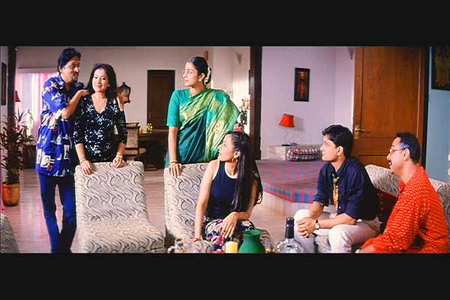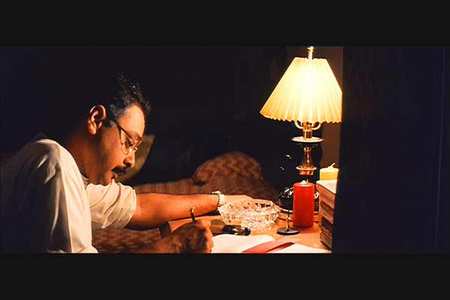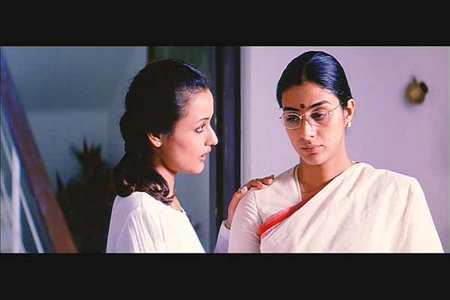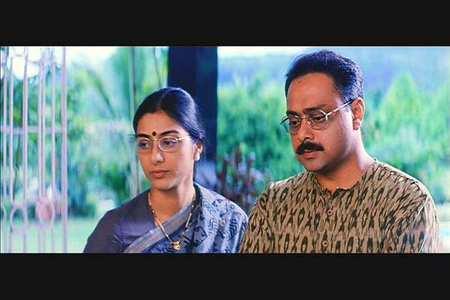Review of Astitva
Introduction
Aditi Shrikant Pandit (Tabu), is an average Indian housewife, who has been married for many years with her chauvinist husband Shrikant Pandit (Sachin Khedekar), a busy business man. She is also a mother of Aniket (Sunil Barve) who is engaged to a modern progressive woman Revathi (Namrata Shirodkar).
When Shrikant`s best friend Dr Ravi (Ravindra Mankani), and his newly married wife Meghna (Smita Jaykar) are in town he invites them for lunch. Aditi doesn`t mind making lunch at such short notice for the unexpected guests. Aditi doesn`t even mind her husband who fails to show any respect towards her while drunk, or when he rudely reads her private registered mail. When he opens the mail, in front of the guests, he becomes drunkenly happy as his wife has inherited a large amount of money and gold from her past music teacher, Malhar(Monish Behl).
Later on that night while writing his diary about his day, he begins to wonder why Malhar has left all of his wealth to Aditi. He confides back to his older diaries to piece together the relationship of Aditi and Malhar. What he learns becomes shocking to him, as he didn`t realize at the time and Shrikant decides to confront his wife. What did Shrikant discover? And how does Aditi take his reaction?
DEI had decided to purchase the film rights for the DVD format. Having a poor run at the cinemas, the film went unrecognizable to its audiences. Yet those limited number of people who saw the film was highly impressed by its demanding screenplay that makes one wonder and think about the situation it presents. One of my favourite movies of the year 2000, now gets the deserve treatment on DVD.

Video
The DVD is presented in its original aspect ratio of 2.66:1, as per the director`s original vision. This feature is supported by an anamorphic transfer.
Signs of compressed artefacts and of grain is out of the question on this DVD as the picture remains very clear from these digital problems. The film is near wear and tear free, only allowing two scenes to have a very light fraction of tiny dust marks that might end up being missed by viewers.
The reason for such excellent picture cleanliness was due to the fact that the film was directly transferred from its original 35mm print in Adlabs laboratories (India). Adlabs are know for their excellent work in transferring film to film, and in this case the result is impressive. The film has never looked better, even beating the theatrical showing.
The overall picture information was detailed to the maximum capacity, and the high levels of sharpness was very satisfactory when tested. All are very well handled and displayed much picture information, especially in anamorphic mode. I should mention that in a couple of scenes, when in letterbox mode only, softness was detected. But they are very short and will not interrupt viewing. Shimmering, moiré effects and edge enhancement problems did not cause any concern on this disc while viewing.
The colour fidelity is the usual from new DEI titles, very cinematic. The colour saturation was natural never allowing hues, bleeding or wrong colour correction/processing to make its mark on this disc. The colours looked impressive as it displayed the contrasting details of brightness and darkness with ease. While greenery, which was seen quite a bit in this film, added vibrancy and vividness.
Dark details and shadows was just the same, and allowed viewers to see more detail without a hint of problem. Contrast details never allowed the halo effect to arise from the blinding whites presented during many scenes.

Audio
The sound on this disc is presented in Dolby Digital 5.1, and is just as one expects from DEI.......marvellous. The presence of a 360 degree soundfield is immediately present to the ears when the film begins with the wonderful song `Zindagi Kya Baat Hai`, displaying the powerful voice of Suhkwinder Singh in high majesty.
The overall balance of the mix between the five channels seems effortless, and the surround action is aggressive but not overwhelming. The sense of envelopment and imaging among all channels is very wide. This was not expected on a drama like this, but I was glad that it was present as it adds to the viewing.
Clean, clear and perfectly balanced, these are expertly produced tracks well capture on DVD by DEI. Bass is quite strong, especially during the more dramatic sequences and songs. But what is perhaps most impressive about the soundtrack is how well the DVD is able to contrast loud and quiet sounds, allowing dialogue to remain intelligible, and not be drowned out by the effects and music. A great 5.1 mix that is reference quality.

Features
The supplements on this DVD are limited to two song promos `Chal Chal` and `Gana Mere Baas Ki Baat Nahin`. Both last around 60 seconds. Also included is a theatrical trailer lasting 3 minutes. All are very entertaining to view and are of reasonable quality. The trailer is in 5.1 sound which is a nice inclusion to have.
The DVD also includes the option of having English subtitles that are very well translated.
The main menus consists of clips and the soundtrack of the film being looped. They are thematically designed, and have easy navigation. While the menu designs were good, the DVD box design is a disappointment and could certainly be improved upon. Also the way the sypnosis was written on the back DVD cover is quite alarming.

Conclusion
The film is a wonderful example of how far Indian cinema can go when evaluating the social climate of the institution we call marriage. The film becomes very intellectual and intelligent in treating this institution looking from the male and female points of view.
It is sad to say this but Indian men generally feel that the average man should be the breadwinner of the house, has the right to have sex anytime he wants (with his wife or with someone else), and has power over the relationship with his wife. This doesn`t just apply to Indian men but to all men around the world. These weak views is the main subject matter that the director Mahesh Manjrekar powerfully tackles after his brilliant features `Niddan (1998)` and `Vaastav (1999)`.
Shot in a record time of eighteen days, this film has the capabilities of winning many awards not just in India but around the globe too. With brilliant performances from the cast that will leave an impact in your mind. The majority of the actors who have performed for this movie, are generally seen in popcorn/masala movies doing secondary roles. But here they show that they are better then the majority of `superstars` in Indian cinema. Sachin Khedekar displays the male chauvinist character very well with his perfect use of his paralanguage and his verbal curiosity with his wife.
The modern day couple played by Smita Jaykar and Ravindra Mankani is also a marvel to view. Their characteristics grows stronger with the performances. The brief character of Revathi is made up of the new Indian woman, both independent and strong willed, also played well by Namrata Shirodkar. The director contrasts her character with that of Aditi under realism and literal contexts. Monish Behl as the music teacher is a also a brief character which deserves credit. Clearly after his performances in other movies like `Hum Aapke Hain Koun (1994)` and `Hum Saat Saat Hain (1999)`. The actor is maturing rather progressively which has certainly pleased all cinema audiences.
But the performance of Tabu as the `Indian housewife` is the best seen on film in the year 2000, and truly deserves all praises. Tabu is able not to perform as Aditi but is Aditi, displaying all emotions that looks honest, real and humanistic. The fact that the character is very well penned out by the director helps Tabu to establish Aditi as a person who while loves her husband realizes that she doesn`t have to `raped` to gain his love. The way Tabu performs at the end of the film is a reason why other actors could never achieve what she has, and is a credit to her acting skills.
The film`s narrative is very well structure delivering a well based equilibrium, and enigma followed by an equilibria that is at its finest. The narrative never gets too tiring or boring as the direction is immersed in the plot, never side-tracking. Also the use of flashback creates interest as we are equally curious as Shrikant was to find out why his wife has received such a large amount of wealth. This interest compliments the beautifully shot cinematography which has allowed the audience to view the world of Shrikant`s family life without making us imposing. Dialogues, which are well written in Hindi, English and Marathi, also helps us to understand them in realistic connotations and in a human fashion.
The soundtrack and song score will not appeal to the masses, as it has a very contemporary sound. Yet it plays melodiously and adds storytelling. I loved the songs in the movie as the music was very different lending itself to jazz, Indian classical and bass -an impressive fusion.
This film is certainly the one that everyone will be talking about, and will be debating over when done with viewing. It will create nothing but commendations and an intellectual talk over the subject matter. One might craze for the blockbusters like `Mohabaatein (2000)` and `Mission: Kashmir (2000)`, but it is films like Astitva that are lending itself to the new-wave of films that are slowly changing the codes and conventions Indian cinema........for the better.
The DVD is another fine example of DEI`s aim to bring the best quality for the Asian audiences, who for many years had to put up with awful film transfers on VHS and VCD. Reference DVD!
Your Opinions and Comments
Be the first to post a comment!